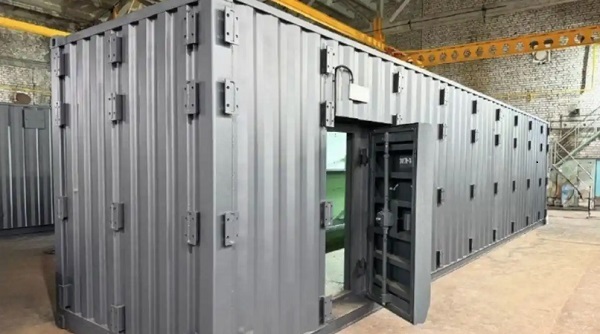Energy
Majority of Canadians Support Canada’s Role as Responsible Energy Producer & Exporter: POLL

A new poll has found that a growing number of Canadians support our country’s role as a responsible and reliable global energy producer and exporter.
According to the poll – conducted by Research Co. on behalf of Canada Action – a majority of Canadians, nearly three out of four (73% of respondents), believe Canada’s liquefied natural gas (LNG) can help improve global energy security and sustainability efforts.
The poll questioned 1,000 adults online across the country and found that most respondents have an overwhelmingly positive view of the energy sector. Other findings include:

> 80% of respondents – or four-in-five Canadians – said that given global energy demand is forecasted to grow 50% by 2050, they support trade in all Canadian energy technologies including solar, wind, hydro, hydrogen, geothermal, biofuels, and oil and gas.
> 79% of respondents – or nearly eight-in-ten Canadians – said they prefer to use Canadian energy in their day-to-day lives.
> 75% of respondents – or three-in-four Canadians – agree that exporting our responsible and reliable energy, expertise and technology to reduce global greenhouse gas (GHG) emissions is one way Canada can play an important role in addressing climate action. This is a one per cent increase since the question was asked in March.
> 73% of respondents – or nearly three-quarters of Canadians – agree that our country should advocate for Canada’s energy sector as a leader in environmentally sustainable production.
> After having been informed that from 2000 to 2019, the emission intensity of Canada’s oil sands operations dropped by approximately 33% due to technological and efficiency improvements, 73% of respondents – or almost three-in-four Canadians – agree we should advocate for Canada’s energy sector as a leader in environmentally sustainable production.
> 63% of respondents – or more than three-in-five Canadians – agree that investing in Canada’s oil and gas sector makes sense if you value climate leadership, social progress and transparency.
> 56% of respondents think its wrong for Canada to forfeit energy opportunities to other countries with higher emissions in regards to LNG – representing a rise in public support of 5% since the last poll in March 2022.
“These latest polling results confirm exactly what we’ve found in our media interviews, community events, social media engagements and public interactions over the last number of months,” said Cody Battershill, Founder and Chief Spokesperson of Canada Action.
“Canadians are coming to understand the world will need oil and gas long into the future, and so Canada should continue to play a strong role as a country that respects workers, families and Indigenous and non-Indigenous communities, and that adheres to the strictest environmental, health and safety regulations in the world,” Battershill added.
The World Needs More Canadian Resources

Canada Action’s latest poll comes amid an ongoing global energy crisis where many countries have asked us for more of what we have: natural gas, hydrogen, minerals and metals, and other critical resources.
As one of the most responsible natural resource producers on the planet, it only makes sense that we provide the world with as much of these commodities as possible while following the world-class sustainability methods and standards our country is known for.
Canada is at a crossroads: either step up to help our closest allies and trade partners in need of our resources, or lose global market share – and the economic and environmental opportunities that come with – to suppliers with fewer protections for human rights and the environment.
A majority of Canadians across the country see the benefits of more Canadian resources on global markets. It’s time our country put its full support behind developing LNG, forestry, mining, oil and other natural resource sectors to benefit our families and the global climate.
About Us
Canada Action is a non-partisan national coalition that advocates for the responsible development of Canada’s various natural resources, for the industries that move that development forward, and for the workers, families and communities the sector supports.
The poll’s margin of error, which measures sample variability, is plus or minus 3.1 percentage points, nineteen times out of twenty.
For more information: Cody Battershill – (403) 370-4008 – [email protected]
Energy
What does a Trump presidency means for Canadian energy?

From Resource Works
Heather-Exner Pirot of the Business Council of Canada and the Macdonald-Laurier Institute spoke with Resource Works about the transition to Donald Trump’s energy policy, hopes for Keystone XL’s revival, EVs, and more.
Do you think it is accurate to say that Trump’s energy policy will be the complete opposite of Joe Biden’s? Or will it be more nuanced than that?
It’s more nuanced than that. US oil and gas production did grow under Biden, as it did under Obama. It’s actually at record levels right now. The US is producing the most oil and gas per day that any nation has ever produced in the history of the world.
That said, the federal government in the US has imposed relatively little control over production. In the absence of restrictive emissions and climate policies that we have in Canada, most of the oil production decisions have been made based on market forces. With prices where they’re at currently, there’s not a lot of shareholder appetite to grow that significantly.
The few areas you can expect change: leasing more federal lands and off shore areas for oil and gas development; rescinding the pause in LNG export permits; eliminating the new methane fee; and removing Biden’s ambitious vehicle fuel efficiency standards, which would subsequently maintain gas demand.
I would say on nuclear energy, there won’t be a reversal, as that file has earned bipartisan support. If anything, a Trump Admin would push regulators to approve SMRs models and projects faster. They want more of all kinds of energy.
Is Keystone XL a dead letter, or is there enough planning and infrastructure still in-place to restart that project?
I haven’t heard any appetite in the private sector to restart that in the short term. I know Alberta is pushing it. I do think it makes sense for North American energy security – energy dominance, as the Trump Admin calls – and I believe there is a market for more Canadian oil in the USA; it makes economic sense. But it’s still looked at as too politically risky for investors.
To have it move forward I think you would need some government support to derisk it. A TMX model, even. And clear evidence of social license and bipartisan support so it can survive the next election on both sides of the border.
Frankly, Northern Gateway is the better project for Canada to restart, under a Conservative government.
Keystone XL was cancelled by Biden prior to the invasion of Ukraine in 2022. Do you think that the reshoring/friendshoring of the energy supply is a far bigger priority now?
It absolutely is a bigger priority. But it’s also a smaller threat. You need to appreciate that North America has become much more energy independent and secure than it has ever been. Both US and Canada are producing at record levels. Combined, we now produce more than the Middle East (41 million boe/d vs 38 million boe/d). And Canada has taken a growing share of US imports (now 60%) even as their import levels have declined.
But there are two risks on the horizon: the first is that oil is a non renewable resource and the US is expected to reach a peak in shale oil production in the next few years. No one wants to go back to the days when OPEC + had dominant market power. I think there will be a lot of demand for Canadian oil to fill the gap left by any decline in US oil production. And Norway’s production is expected to peak imminently as well.
The second is the need from our allies for LNG. Europe is still dependent on Russia for natural gas, energy demand is growing in Asia, and high industrial energy costs are weighing on both. More and cheaper LNG from North America is highly important for the energy security of our allies, and thus the western alliance as it faces a challenge from Russia, China and Iran.
Canada has little choice but to follow the US lead on many issues such as EVs and tariffs on China. Regarding energy policy, does Canada’s relative strength in the oil and gas sector give it a stronger hand when it comes to having an independent energy policy?
I don’t think we want an independent energy policy. I would argue we both benefit from alignment and interdependence. And we’ve built up that interdependence on the infrastructure side over decades: pipelines, refineries, transmission, everything.
That interdependence gives us a stronger hand in other areas of the economy. Any tariffs on Canadian energy would absolutely not be in American’s interests in terms of their energy dominance agenda. Trump wants to drop energy costs, not hike them.
I think we can leverage tariff exemptions in energy to other sectors, such as manufacturing, which is more vulnerable. But you have to make the case for why that makes sense for US, not just Canada. And that’s because we need as much industrial capacity in the west as we can muster to counter China and Russia. America First is fine, but this is not the time for America Alone.
Do you see provinces like Alberta and Saskatchewan being more on-side with the US than the federal government when it comes to energy?
Of course. The North American capital that is threatening their economic interests is not Washington DC; it’s Ottawa.
I think you are seeing some recognition – much belated and fast on the heels of an emissions cap that could shut in over 2 million boe of production! – that what makes Canada important to the United States and in the world is our oil and gas and uranium and critical minerals and agricultural products.
We’ve spent almost a decade constraining those sectors. There is no doubt a Trump Admin will be complicated, but at the very least it’s clarified how important those sectors are to our soft and hard power.
It’s not too late for Canada to flex its muscles on the world stage and use its resources to advance our national interests, and our allies’ interests. In fact, it’s absolutely critical that we do so.
Energy
What Will Be the Future of the Keystone XL Pipeline Under President Trump?

From EnergyNow.ca
By Terry Winnitoy, EnergyNow
The Keystone XL Pipeline, proposed in 2008, was designed to transport Canadian crude oil from Alberta to refineries in the United States, specifically to Steele City, Nebraska, and onward to refineries in Illinois and Texas, as well as to an oil pipeline distribution center in Cushing, Oklahoma.
Spanning approximately 1,179 miles and designed to transport up to 830,000 barrels of oil per day, the pipeline promised significant economic and energy security benefits. However, it became a focal point of political and environmental controversy, leading to its eventual cancellation by Presidents Obama and Biden.
Here’s a brief look at its history, the reasons it should have been built, the political dynamics that led to its cancellation and will President-elect Trump revive it?
Why the Keystone XL Pipeline Should Have Been Built
Economic and Job Creation
The pipeline was projected to create thousands of construction jobs and several hundred permanent jobs, providing a significant boost to the economy. It was also expected to stimulate economic activity through the development of related infrastructure and services.
Energy Security
By facilitating the efficient transport of a large volume of oil from a stable and friendly neighboring country, the pipeline would have reduced American dependence on oil imports from more volatile regions, enhancing national energy security.
Environmental Safety
Pipelines are generally safer and more environmentally friendly for transporting oil compared to rail or truck, with lower risks of spills and accidents. The Keystone XL was designed with the latest technology to minimize leaks and environmental impact.
Regulatory Oversight
The project underwent extensive environmental reviews and was subject to strict regulatory standards to ensure it adhered to environmental protection and safety measures.
Political Reasons for Cancellation
Environmental Activism
The pipeline became a symbol for environmentalists who opposed further development of fossil fuel infrastructure. They argued it would contribute to climate change by enabling the extraction and consumption of oil sands, which are more carbon-intensive than other oil sources.
Obama’s Cancellation
President Obama rejected the pipeline in 2015, citing environmental concerns and its potential impact on global climate change. He argued that approving the pipeline would have undercut America’s leadership on climate change.
Trump’s Reversal and Biden’s Final Cancellation
President Trump revived the project in 2017, citing economic benefits and energy security. However, President Biden canceled it again on his first day in office in 2021, fulfilling a campaign promise to prioritize climate change issues and transition towards renewable energy.
Political Symbolism
For both Obama and Biden, the decision to cancel the Keystone XL Pipeline was also a symbolic gesture, demonstrating a commitment to environmental sustainability and a shift away from fossil fuel dependence in line with their administrations’ climate policies.
Will President-Elect Trump Reinstate It?
Currently, there is no definitive answer on whether President-elect Trump will reinstate the Keystone XL Pipeline. His previous administration showed support for the project, citing its potential economic and energy security benefits. However, reinstating the pipeline would require navigating significant political, legal, and environmental challenges that have developed over the years.
It would also depend on the current geopolitical, economic, and environmental priorities at the time of his taking office. The Keystone XL Pipeline’s history is a complex tapestry of economic aspirations, environmental concerns, and political maneuvers.
Its cancellation has been a contentious issue, reflecting the broader national and global debates over energy policy and climate change strategy. Whether it will be reinstated remains a significant question, contingent on a multitude of factors including political will, environmental policies, and market dynamics.
That all said, re-instating its approval might be the perfect “in your face” moment for Trump to Obama and Biden as he begins his second term of presidency. We’ll have to wait and see.
-

 ESG2 days ago
ESG2 days agoCan’t afford Rent? Groceries for your kids? Trudeau says suck it up and pay the tax!
-

 John Stossel2 days ago
John Stossel2 days agoGreen Energy Needs Minerals, Yet America Blocks New Mines
-

 Daily Caller2 days ago
Daily Caller2 days agoLos Angeles Passes ‘Sanctuary City’ Ordinance In Wake Of Trump’s Deportation Plan
-

 Alberta2 days ago
Alberta2 days agoProvince considering new Red Deer River reservoir east of Red Deer
-

 Addictions2 days ago
Addictions2 days agoBC Addictions Expert Questions Ties Between Safer Supply Advocates and For-Profit Companies
-

 Aristotle Foundation1 day ago
Aristotle Foundation1 day agoToronto cancels history, again: The irony and injustice of renaming Yonge-Dundas Square to Sankofa Square
-

 conflict2 days ago
conflict2 days agoPutin Launches Mass-Production of Nuclear Shelters for his People
-

 conflict1 day ago
conflict1 day agoUS and UK authorize missile strikes into Russia, but are we really in danger of World War III?






